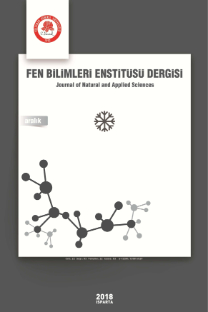Dopamin ve Ürik Asit Tayini İçin 2-Boyutlu MoSe2 Bazlı Elektrokimyasal Sensör Geliştirilmesi
Geçiş metal dikalkojenit, Molibden diselenür, Elektrokimyasal sensör, Dopamine, Ürik asit, Transition metal dichalcogenide, Molybdenum diselenide, Electrochemical sensor, Uric acid
Development of MoSe2-based Electrochemical Sensor for Detection of Dopamine and Uric Acid
Transition metal dichalcogenide, Molybdenum diselenide, Electrochemical sensor, Uric acid, Dopamine,
___
- [1] Abu Zahed, Md., Barman, S.C., Toyabur, R.M., Sharifuzzaman, Md., Xuan, X., Nah, J., Park, J.Y. 2019. Ex situ hybridized hexagonal cobalt oxide nanosheets and RGO@MWCNT based nanocomposite for ultra-selective electrochemical detection of ascorbic acid, dopamine, and uric acid. Journal of the Electrochemical Society, 166 (6), B304-B311.
- [2] Zaidi, S.A. 2018. Development of molecular imprinted polymers based strategies for the determination of Dopamine. Sensors and Actuators, B: Chemical, 265, 488-497.
- [3] Arrigoni, O., De Tullio, M.C. 2002. Ascorbic acid: Much more than just an antioxidant. Biochimica et Biophysica Acta - General Subjects, 1569 (1-3), 1-9.
- [4] Becker, B.F. 1993. Towards the physiological function of uric acid. Free Radical Biology and Medicine, 14 (6), 615-631.
- [5] Sheng, Z. H.; Zheng, X. Q.; Xu, J. Y.; Bao, W. J.; Wang, F. Bin; Xia, X. H. 2012. Electrochemical Sensor Based on Nitrogen Doped Graphene: Simultaneous Determination of Ascorbic Acid, Dopamine and Uric Acid. Biosensors and Bioelectronics, 34 (1), 125–131.
- [6] Jackowska, K.; Krysinski, P. 2013. New Trends in the Electrochemical Sensing of Dopamine. Analytical and Bioanalytical Chemistry, 405 (11), 3753–3771.
- [7] Atta, N. F., El-Kady, M. F., Galal, A. 2009. Palladium nanoclusters-coated polyfuran as a novel sensor for catecholamine neurotransmitters and paracetamol. Sensors and Actuators B: Chemical, 41(2), 566-574.
- [8] Tukimin, N., Abdullah, J., Sulaiman, Y. 2018. Review—electrochemical detection of uric acid, dopamine and ascorbic acid. Journal of the Electrochemical Society, 165 (7), B258-B267.
- [9] Kaya, S.I., Kurbanoglu, S., Ozkan, S.A. 2019. Nanomaterials-Based Nanosensors for the Simultaneous Electrochemical Determination of Biologically Important Compounds: Ascorbic Acid, Uric Acid, and Dopamine. Critical Reviews in Analytical Chemistry, 49 (2), 101-125.
- [10] Abouimrane, A., Dambournet, D., Chapman, K.W., Chupas, P.J., Weng, W., Amine, K. 2012. A new class of lithium and sodium rechargeable batteries based on selenium and selenium-sulfur as a positive electrode. Journal of the American Chemical Society, 134 (10), 4505-4508.
- [11] Eftekhari, A. 2017. Molybdenum diselenide (MoSe2) for energy storage, catalysis, and optoelectronics. Applied Materials Today, 8, 1-17.
- [12] Najafi, L., Bellani, S., Oropesa-Nuñez, R., Ansaldo, A., Prato, M., Del Rio Castillo, A.E., Bonaccorso, F. 2018. Engineered MoSe2-Based Heterostructures for Efficient Electrochemical Hydrogen Evolution Reaction. Advanced Energy Materials, 8 (16), art. no. 1703212.
- [13] Shu, H., Zhou, D., Li, F., Cao, D., Chen, X. 2017. Defect Engineering in MoSe2 for the Hydrogen Evolution Reaction: From Point Defects to Edges. ACS Applied Materials and Interfaces, 9 (49), 42688-42698.
- [14] Upadhyay, S., Pandey, O.P. 2021. Synthesis of layered 2H–MoSe2 nanosheets for the high-performance supercapacitor electrode material. Journal of Alloys and Compounds, 857, art. no. 157522.
- [15] Zang, Y.-J., Nie, J., He, B., Yin, W., Zheng, J., Hou, C.-J., Huo, D.-Q., Yang, M., Liu, F.-M., Sun, Q.-Q., Qin, Y.-L., Fa, H.-B. 2020. Fabrication of S-MoSe2/NSG/Au/MIPs imprinted composites for electrochemical detection of dopamine based on synergistic effect. Microchemical Journal, 156, art. no. 104845.
- [16] Balasingam, S.K., Lee, J.S., Jun, Y. 2015. Few-layered MoSe2 nanosheets as an advanced electrode material for supercapacitors. Dalton Transactions, 44 (35), 15491-15498.
- [17] Cogal, S., Ramani, S., Bhethanabotla, V.R., Kuhn, J.N. 2021. Unravelling the Origin of Enhanced Electrochemical Performance in CoSe2−MoSe2 Interfaces. ChemCatChem, 13(8), 2021, 2017-2024.
- [18] Guo, W., Chen, Y., Wang, L., Xu, J., Zeng, D., Peng, D.-L. 2017. Colloidal synthesis of MoSe2 nanonetworks and nanoflowers with efficient electrocatalytic hydrogen-evolution activity. Electrochimica Acta, 231, pp. 69-76.
- [19] Cogal, S. 2018. Electrochemical Determination of Dopamine Using a Poly(3,4-Ethylenedioxythiophene)-Reduced Graphene Oxide-Modified Glassy Carbon Electrode. Analytical Letters, 51 (11), 1666-1679.
- [20] Cheng, J., Wang, X., Nie, T., Yin, L., Wang, S., Zhao, Y., Wu, H., Mei, H. 2020. A novel electrochemical sensing platform for detection of dopamine based on gold nanobipyramid/multi-walled carbon nanotube hybrids. Analytical and Bioanalytical Chemistry, 412 (11), 2433-2441.
- [21] Li, R., Liang, H., Zhu, M., Lai, M., Wang, S., Zhang, H., Ye, H., Zhu, R., Zhang, W. 2021. Electrochemical dual signal sensing platform for the simultaneous determination of dopamine, uric acid and glucose based on copper and cerium bimetallic carbon nanocomposites. Bioelectrochemistry, 139, art. no. 107745.
- [22] Kim, B.-K., Lee, J.Y., Park, J.H., Kwak, J. 2013. Electrochemical detection of dopamine using a bare indium-tin oxide electrode and scan rate control. Journal of Electroanalytical Chemistry, 708, pp. 7-12.
- [23] Raghu, P., Reddy, T. M., Gopal, P., Reddaiah, K.,Sreedhar, N. Y. 2014. A novel horseradishperoxidase biosensor towards the detection ofdopamine: A voltammetric study. Enzyme andMicrobial Technology, 57, 8-15.
- ISSN: 1300-7688
- Yayın Aralığı: 3
- Başlangıç: 1995
- Yayıncı: Süleyman Demirel Üniversitesi
Ahmet Çağrı ATA, Aslıhan Aycan TANRIVERDİ, Ümit YILDIKO, İsmail ÇAKMAK
Medyan Sıralı Küme Örneklemesinde Normal Dağılımın Konum Parametresi İçin Shrinkage Tahmin Edicileri
Kübra GÜRSOY, Meral EBEGİL, Yaprak ÖZDEMİR, Fikri GÖKPINAR
Kashuri Fundo Dönüşümünün Bozunma Problemine Uygulanması
Haldun Alpaslan PEKER, Fatma Aybike ÇUHA
Nevin AKDURA, Handan ÇULAL KILIÇ
Lurus kraepelini (Scorpiones, Luridae) Zehir Bezi Glikoproteinlerinin Histokimyasal Yapısı
Yalçın ERZURUMLU, Hatice Kübra DOĞAN
Aslıhan KURNUÇ SEYHAN, Muhammed ÇERÇİ
Bir Eğitim Uçağı Hidrolik Kriko Sistemi İçin Hesaplamalı ve Deneysel Gerilme Analizi
